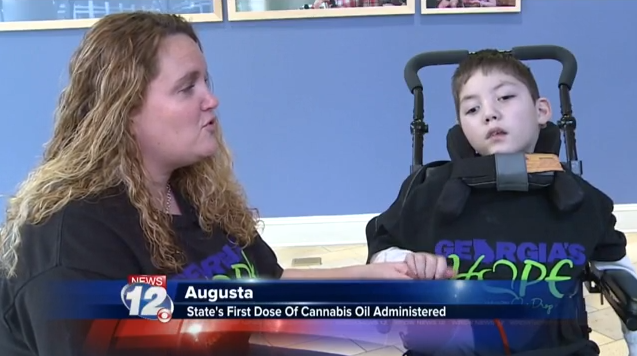Experimental Marijuana Drug Epidiolex Given To Its First Patient: A 7-Year-Old Georgia Boy With Seizures

Preston Weaver is 7 years old and unable to walk, talk, or see. He suffers from debilitating seizures caused by a form of epilepsy called Lennox-Gastaut syndrome — a disorder without a cure, which left his parents struggling to find hope for treatment.
But soon, little Preston might be one of the first children in the state of Georgia to see dramatic improvements after being placed on an experimental marijuana treatment, as part of a clinical trial. Recently, he was taken to Georgia Regent University for his very first treatment of Epidiolex, an experimental drug developed by GW Pharmaceuticals that contains cannabidiol (the chemical in marijuana that's unable to make patients high). Epidiolex hasn’t yet been approved by the Food and Drug Administration (FDA), but if the clinical trial is successful, it may soon offer one avenue for children with Lennox-Gastaut syndrome or other forms of epilepsy to live more normal lives. Preston is one of about 50 children involved in the trial.
Georgia Governor Nathan Deal approved the trial after a bill meant to legalized the drug specifically for ill children was nixed in the state legislature. “No one with a heart could hear the stories of these children and their parents and not want to exhaust every possibility to provide them with the treatment they need to combat this debilitating condition,” Deal said, according to ABC News.
More children suffering from the same disorder and other types of epilepsy are waiting for this treatment, or a similar one. “Even though Preston is on it, Preston and I are still going to fight for all the other [children] too,” Valarie Weaver, Preston’s mother, told ABC News. “We need to be there until this becomes legal and every child in the state has the option for this treatment if they need it.”
Cannabidiol Offers Hope
The trial being carried out at Georgia Regent University is only one of a handful that are being held throughout the country for “compassionate use” of medical marijuana. Expanded access, or compassionate use, is an FDA regulation that allows experimental drugs (such as those involving some form of pot) to be administered only to a few seriously ill patients who meet certain FDA criteria. Once such example is having an immediately life-threatening disease, and having no other options for treatment.
While many states still haven’t legalized medical marijuana, those that have offer hope to sick people — ranging from epileptic toddlers to cancer patients — either in the form of treatment or comfort in alleviating pain. As of June 2014, there are 23 states that have legalized cannabis medicinally. Marijuana has already been used in the past to treat children with severe seizures, and has proven to help them immensely. In the case of Charlotte Figi, for example, medical marijuana reduced her seizures to once or twice a month, and allowed her to walk, feed herself, and speak. In Preston’s case, no one is sure whether the experimental drug will work on him or not. But Weaver told ABC News, “Our hope is that this treatment will calm down his brain enough so that he will start communicating with us."
“This is the first day of the rest of his life,” she told WRDW.com. “I’m just completely overjoyed he was chosen to get this. We’re just completely blessed.”



























